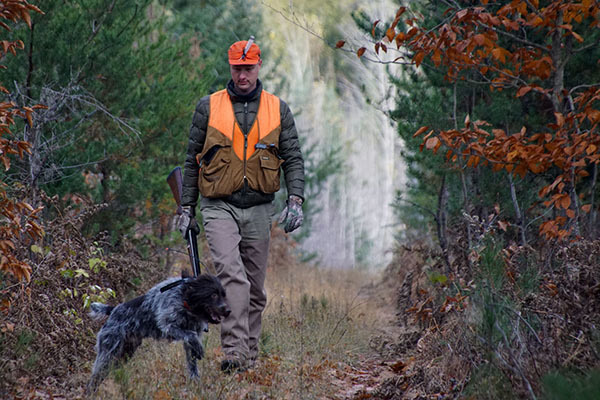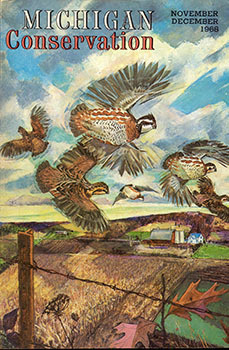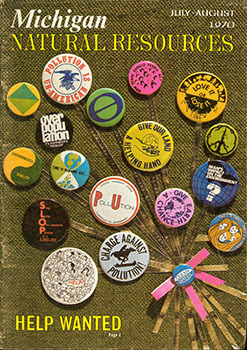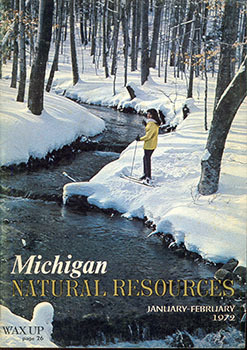 March 30, 2021 March 30, 2021
Contact: Ed Golder 517-643-6406 or John Pepin, 906-226-1352
From restoration and recovery to resiliency and relevancy, DNR celebrates 100 years of conservation success
 One hundred years ago today, the Michigan Department of Conservation – the precursor to the Michigan Department of Natural Resources – was created as part of a state government reorganization effort by then Gov. Alex Groesbeck. One hundred years ago today, the Michigan Department of Conservation – the precursor to the Michigan Department of Natural Resources – was created as part of a state government reorganization effort by then Gov. Alex Groesbeck.
The legislation approved a century ago today combined numerous components of state government into the departments of agriculture, industrial and labor, and conservation.
“That was a time when the conservation movement and the fish and wildlife movement across the country was just kind of getting born,” said DNR Director Dan Eichinger.
In Michigan, those early Department of Conservation efforts focused on restoration of damaged landscapes and the recovery of game species and the habitats they live within. That work would characterize much of the new department’s activities over its first 100 years.
Eichinger said the Department of Conservation was created to be a hub where several state functions could be housed, managed and provided for. These activities included Michigan’s state parks program, game and fish law enforcement and the nascent movement toward protecting and conserving fish and wildlife and the places they depend upon.
“We’ve seen that mission expand and grow over the intervening 100 years from just being state parks, just doing some wildlife reintroductions, just doing fish stocking to now having a really expansive menu of areas that we work in,” Eichinger said. |
 In 1968, the name of the Michigan Department of Conservation was changed to the Michigan Department of Natural Resources to reflect widening responsibilities. In 1968, the name of the Michigan Department of Conservation was changed to the Michigan Department of Natural Resources to reflect widening responsibilities.
Over the decades, several key pieces of legislation worked to aid the department in its mission to remain “committed to the conservation, protection, management, use and enjoyment of the state’s natural and cultural resources for current and future generations.”
In an interview earlier this month on the program “Naturally Speaking” on WGVU-FM in Grand Rapids, Eichinger discussed the importance of significant wildlife species recoveries achieved in Michigan.
Some of these species that have attained recovered status include the Kirtland’s warbler, wild turkey, bald eagle and gray wolf.
“These are really important milestones because it’s sort of proof-positive that when you have the alignment of resources, the alignment of talent and the alignment of partnership, we can be successful in recovering species that were critically endangered and that is not only providing a regulatory framework to provide for their long-term conservation, but actually doing the really hard work on the ground, making sure that those habitats are conserved and that they’re restored,” Eichinger told program host Shelly Irwin.
Eichinger said none those alignment activities happen in a vacuum. |
 “That’s one of the remarkable things about what we have here in this state, that the story of the Department of Natural Resources is as much a story about the citizen conservationists across our state and throughout our history who have supported our work, stood side-by-side with us as we have worked to recover species, help to identify places the department needs to be pointing effort and pointing work towards,” Eichinger said. “The species that we have stewardship responsibility for are the fortunate beneficiaries of that tremendous partnership with state government, our citizens, federal actors, the non-profit community. It’s a fantastic and important part of the story of conservation.” “That’s one of the remarkable things about what we have here in this state, that the story of the Department of Natural Resources is as much a story about the citizen conservationists across our state and throughout our history who have supported our work, stood side-by-side with us as we have worked to recover species, help to identify places the department needs to be pointing effort and pointing work towards,” Eichinger said. “The species that we have stewardship responsibility for are the fortunate beneficiaries of that tremendous partnership with state government, our citizens, federal actors, the non-profit community. It’s a fantastic and important part of the story of conservation.”
Eichinger said the DNR’s mission is necessarily long-term and makes the department “think over the horizon.”
“That’s one of the things I think is really gratifying about this work and I think why the folks who work in this space are so passionate about it – that the resources that we enjoy today in the good condition that they’re in is because of work that was done, 20, 30, 40, 50 years ago,” Eichinger said. “Folks who had long-term vision to say, ‘I might not necessarily see all the fruits of my efforts today, but I know future generations will be able to derive benefit from them.’”
Eichinger said that perspective is a wonderful way to think about your work, and he’s excited to “work in a space that necessarily requires that sort of long-term thinking.”
Looking ahead, Eichinger said the next century for the department will be about resiliency and relevancy. |
 “We obviously are dealing with the negative effects of climate change and how that’s expressing itself on the landscapes that we manage,” Eichinger said. “And so, we’re going to need to start to pivot our management approach just a bit to be thinking a little bit more about how we create resiliency on the landscape in the face of change through climate change: invasive species, fish and wildlife health, those kinds of things.” “We obviously are dealing with the negative effects of climate change and how that’s expressing itself on the landscapes that we manage,” Eichinger said. “And so, we’re going to need to start to pivot our management approach just a bit to be thinking a little bit more about how we create resiliency on the landscape in the face of change through climate change: invasive species, fish and wildlife health, those kinds of things.”
Eichinger said the department also needs to focus on remaining relevant and valued to not only a core constituency, but to those who may not have yet begun to enjoy the outdoors to the extent possible.
“It’s really important for us to make sure that the work that we do is seen, it is valued, is understood and is available and accessible to all the people in the state of Michigan,” Eichinger said. “That’s what’s going to make our work relevant.”
Throughout 2021, the DNR is commemorating and celebrating the 100-year anniversary of the department. Plans for in-person events have been scaled back because of the coronavirus pandemic.
DNR staffers have created a webpage at Michigan.gov/DNRCentennial to link the public to several ways to participate in exploration of the past century of the department’s efforts. As part of this, the DNR has produced 100 ways to celebrate the centennial.
Governor Gretchen Whitmer is issuing a Michigan Department of Natural Resources Centennial Day proclamation.
Eichinger said the best way the department and everyone else in Michigan can celebrate the shared success of the past century of conservation commitment is to get outdoors.
“Find a way that you and your loved ones can connect with nature, find a pathway that you’ve never walked down, find your way or make your way to one of our beautiful state parks, one of the tremendous hidden places in our state forest system, wherever it is that you go, find a way and find a reason to get outdoors and share that with special people in your life,” Eichinger said. “There’s no better way to celebrate the work that we’ve all been able to accomplish than by simply getting outdoors and enjoying what we have in this beautiful state.”
For more information on the wide range of outdoor recreation opportunities and natural resource conservation activities the DNR is responsible for, visit Michigan.gov/DNR. |
/Note to editors: Accompanying photos are available below for download. Caption information follows. Credit: Michigan Department of Natural Resources, unless otherwise noted.
Additional DNR centennial related photos available for media use are available.
Eichinger: Michigan Department of Natural Resources Director Dan Eichinger is shown on a hunting walk with his dog.
MC 1965: The cover of the November-December 1965 issue of Michigan Conservation magazine is shown.
MC 1968: The cover of the November-December 1968 issue of Michigan Conservation magazine is shown.
MNR 1970: The cover of the July-August 1970 issue of Michigan Natural Resources magazine is shown. The name of the publication was changed after 1968 to reflect the change in the name of the department from the Department of Conservation to the Michigan Department of Natural Resources.
MNR 1972: The cover of the March-April 1972 issue of Michigan Natural Resources magazine is shown. The name of the publication was changed after 1968 to reflect the change in the name of the department from the Department of Conservation to the Michigan Department of Natural Resources.
Portrait: A Michigan Department of Natural Resources portrait of DNR Director Dan Eichinger./ |

